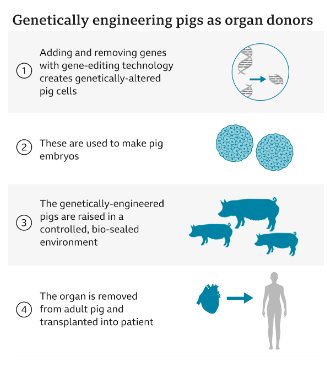Context:
More than a month after surgeons in New York transplanted a pig kidney into a human being, the animal organ is still working.
| Concept of Xenotransplantation: It is the transplantation of cells, tissues or organs from one species to another, particularly from animals to humans. |
Recent Xenotransplantation Breakthroughs:

- Pig Kidney Success (September 2021): In New York Hospital, a gene-edited pig kidney was successfully transplanted into a brain-dead patient.
- Modified Pig Heart (January 2022 – University of Maryland): Doctors used a genetically modified pig heart for a patient with no other options.
- German Organ Farm Initiative: A German doctor plans to establish a farm for cultivating genetically modified organs, aiming to address organ scarcity and enhance transplantation possibilities.
Ethical Issues in Xenotransplantation:
- Animal Rights: Critics from the animal rights movement argue that xenotransplantation disregards the rights of animals. They assert that animals have intrinsic rights that should not be violated for human benefit.
- Anthropocentrism and Moral Responsibility: Xenotransplantation often reflects an anthropocentric view, where humans prioritize their needs over animals. This philosophy raises ethical concerns and is seen as a contributing factor to ecological crises.
- Mahatma Gandhi was opposed to the practice of vivisection.
- Medical Implications: Xenotransplants pose substantial risks due to the potential for organ rejection and unknown consequences.
- Ethical debates revolve around whether patients should undergo such risky procedures if they fully understand the dangers.
- Religious Considerations: Pigs are commonly chosen for xenotransplants due to organ size similarity. However, using pig organs may clash with the beliefs and dietary restrictions of certain religious and cultural groups, such as Jews, Muslims, Jains, and vegetarians, who view pigs as impure or refrain from pork consumption.
- Religious Conflicts: Transplanting pig organs may create ethical conflicts for individuals whose religious principles prohibit interactions with pigs, potentially limiting their medical options.
Conclusion:
- The wider adoption of xenotransplant procedures indeed holds promise in addressing the illegal and immoral market for human organs, where individuals, including children, are abducted for organ harvesting.
- The current state of organ transplantation reveals a profound crisis. With over 100,000 individuals in the USA on the national waiting list, predominantly for kidneys.
News Source: The Indian Express
![]() 21 Aug 2023
21 Aug 2023
